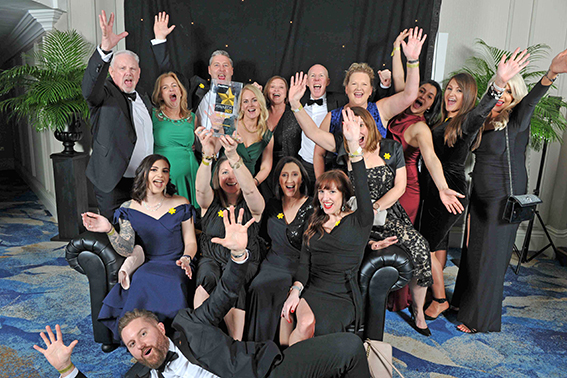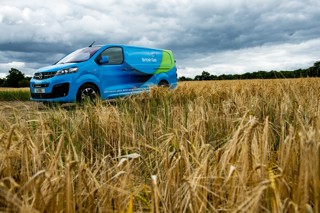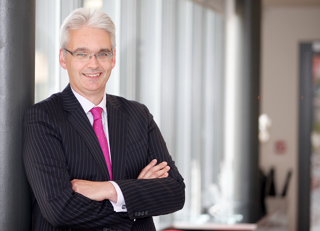
It’s been a record-breaking year for Novuna Vehicle Solutions. It was named Leasing Company of the Year for 20,000-plus vehicles at this year’s Fleet News Awards, for the fourth consecutive year, and reported pre-tax profits almost three times those achieved in the previous financial year.
Part of Mitsubishi HC Capital UK, the leasing company generated pre-tax profits of £54.2 million in 2021/22, set against the backdrop of a decline in production driven by the semiconductor shortage.
Profit before tax in the previous financial year (2020/21) was £19.7m, compared with the £25.7m achieved in 2019/20, before the pandemic.
Success can be attributed, predominantly, to increased revenues from an 8% expansion in its contract hire fleet, with the addition of more than 6,000 vehicles (as well as strong residual values for de-fleeted cars over the past couple of years) to its operating fleet of more than 98,000 assets.
As a result, the fleet value of Novuna Vehicle Solutions (formerly Hitachi Capital Vehicle Solutions) has increased by £300m, from £1.2 billion to £1.5bn, up 21% year-on-year, consolidating its position as the seventh largest leasing company in the UK, according to the FN50.
The business has also capitalised on strong demand in the used car market, as global supply chain challenges resulted in long delivery times for new vehicles.

It’s been a record-breaking year for Novuna Vehicle Solutions. It was named Leasing Company of the Year for 20,000-plus vehicles at this year’s Fleet News Awards, for the fourth consecutive year, and reported pre-tax profits almost three times those achieved in the previous financial year.
Part of Mitsubishi HC Capital UK, the leasing company generated pre-tax profits of £54.2 million in 2021/22, set against the backdrop of a decline in production driven by the semiconductor shortage.
Profit before tax in the previous financial year (2020/21) was £19.7m, compared with the £25.7m achieved in 2019/20, before the pandemic.
Success can be attributed, predominantly, to increased revenues from an 8% expansion in its contract hire fleet, with the addition of more than 6,000 vehicles (as well as strong residual values for de-fleeted cars over the past couple of years) to its operating fleet of more than 98,000 assets.
As a result, the fleet value of Novuna Vehicle Solutions (formerly Hitachi Capital Vehicle Solutions) has increased by £300m, from £1.2 billion to £1.5bn, up 21% year-on-year, consolidating its position as the seventh largest leasing company in the UK, according to the FN50.
The business has also capitalised on strong demand in the used car market, as global supply chain challenges resulted in long delivery times for new vehicles.
Novuna Vehicle Solutions managing director Jon Lawes says the expansion of its operating fleet has defied industry trends given the “significant market headwinds”.
“Over the course of the year, we have continued to carve out a reputation as sector leaders in decarbonisation and we are continuing to help drivers, businesses and fleets throughout their journey to electrification,” he adds.
Novuna’s advocacy for zero-emission vehicles remains a primary driver of future growth and a key tenet of its long-term strategy.
Alternative fuel vehicles have increased from 11% to 19% across all asset types in the funded customer fleet, with the overall pure electric vehicle (EV) fleet increasing by 173% year-on-year.
The company has made a firm commitment to electrify 100% of its car and van fleet (3.5 tonnes and less) and 50% of its funded large van and truck fleet (vehicles in excess of 3.5 tonnes) by 2030.
Lawes is adamant the business will succeed in reaching the ambitious target. “This is our number one priority,” he says.
“We have two key strategies; one is customer first, which is putting the customer at the heart of our business, and the other is decarbonisation.”
Fleet News: What progress are you making towards electrifying the fleet?
Jon Lawes: We’ve doubled the penetration of electric and alternative fuels in the past 12 months. Nearly, 100% of our company car orders are alternative fuels, but we’ve made quite a significant shift towards that target across all asset classes.
FN: What role is salary sacrifice playing in helping drivers make the switch to EVs?
JL: We’re writing so much salary sacrifice business; we’ve seen a 20-fold increase (in the number of employers signing up to schemes). We think we make a difference in the market. We’re very hands-on – it’s all about engagement.
FN: Are employers replacing existing company car policies with salary sacrifice or are they in addition to those schemes?
JL: They’re very much new people and what we’re finding is cash-takers are going back into their company car schemes. There are a few customers where they just run a salary sacrifice scheme but that’s the minority. Salary sacrifice tends to be an all-employee scheme and sit alongside the company car scheme, rather than replacing it. There are so many advantages to salary sacrifice in terms of the tax. It’s a very cost-effective way of running a vehicle.
FN: Is salary sacrifice where you are seeing the greatest growth at the moment?
JL: We’re seeing more growth in that area, but we’re also seeing a lot of growth in company cars.
FN: Is that growth being driven by a desire by firms to decarbonise their operations?
JL: I believe passionately that if I help customers with their problems, they will stay with us, and their biggest problem is how do we help them decarbonise. It’s about everything from cars to vans, to trucks. We’ve got electric refuse collection vehicles on our fleet; we’re designing a welfare bus which is fully electric. We’re looking at every single asset class to see how we can electrify it – 89% of our corporate customers have some form of electric vehicle with us.
FN: Are electric vans beginning to gain greater traction in the market?
JL: There has been a lot of progress in the past six months. We’ve had a lot of success with the e-Vivaro with British Gas, but if businesses wait until 2030 (to make the switch to electric vans) they will lose competitive advantage.
Businesses need to work out how they adopt electric vehicles, and we can help them do that. That’s what our role is.
I’m not saying do a wholesale change with vans overnight but get the trails in place. The sooner you try, the sooner you work out what works for your business.
FN: So how are you helping fleets navigate the electrification of these vehicles?
JL: One of the things we’ve done is set up a dedicated decarbonisation team.
We have the solutions to cater for home charging and workplace charging, and depot charging as well. We also own 19.6% of Gridserve so we’ve got the know-how and the capability of that business.
Our solution goes right the way from doing the TCO (total cost of ownership) model on electric vehicles to specialists that do site surveys to see what’s the capacity on the grid.
And, if it hasn’t got the capacity, we’ve got solar and battery solutions.
Our own site in Trowbridge will become a showpiece facility in the next three months.
The sooner organisations can start trialling electric vehicles, the sooner we can find out where the problems are and start tackling them together.
Our mantra is that we want to help our customers go on that journey, so they come out the other side faster than their competitors.
FN: One of the biggest challenges for fleets has been vehicle availability; is the situation improving?
JL: We’re not seeing it get any worse, but we’re not seeing it get any better either.
The market has completely changed in terms of supply and demand. It is genuinely a big problem, but I do think that the fleet industry is quite resilient.
I can’t see it changing for at least 12 months with cars and 18-24 months with commercial vehicles.
FN: Some fleets are having orders cancelled, how are you managing cancellations?
JL: It’s affecting the whole industry; you’re letting the customer down and it’s not right. The one thing I’d invite the OEMs to think about is that fulfilment of orders.
It’s so hard for someone to order a vehicle and then six months later find out it’s been cancelled, and they’ve got to start the whole process again.
As well as disruption to supply, fleets and the wider leasing industry are facing increased costs, with the war in Ukraine impacting global economies.
Lawes, who was recently appointed chairman of the British Vehicle Rental and Leasing Association (BVRLA), explains that these increases are being keenly felt by the industry.
However, with inflation surpassing 9% and predicted to increase further, Lawes says vehicle leasing can offer certainty in uncertain times.
“There’s never been a better time to lease a vehicle,” he contends. “The principle benefit of contract hire is you’ve got fixed pricing. How many other costs in the business, when you’ve got 9% inflation, can you say that about?”
The advantage of fixing costs for three-to-four years is one not to be ignored, according to Lawes.
Given the current economic backdrop, he also believes fleets should be combining contract hire with fixed price maintenance. He says:
“Otherwise, you’re in the hands of the gods in terms of what’s going to happen to your cost base.”
Sponsors' comments
We are extremely pleased that Novuna Vehicle Solutions won the Leasing Company of the Year – more than 20,000 vehicles category sponsored by Jaama. Well done to managing director Jon Lawes and his team. We know 2021 was an exciting year for the company including its name change from Hitachi to Novuna and the strong fleet growth it reported at the FN50.
Jaama has been an award sponsor at the event for many years and was pleased to see the event back in person at the Grosvenor House Hotel. It provided an excellent opportunity to get back in touch with so many customers, suppliers, and friends face-to-face for the first time in two years.
The evening celebrates the best companies in fleet and is particularly relevant for Jaama now that we are software solutions providers to a quarter of the Fleet News FN50. Well done to Novuna and all the winners.
Login to continue reading.
This article is premium content. To view, please register for free or sign in to read it.























Login to comment
Comments
No comments have been made yet.